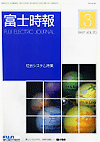FUJI ELECTRIC JOURNAL Vol.70-No.3 (Mar/1997)
 |
Social systems |
A Review of Social Systems
Kazuo Sekiguchi
This paper grasps the infrastructure of social systems supporting a community with the core of a city, namely an urban society, as "the six fields of social systems" and introduces the concept and trend of each field. Technical concepts that Fuji Electric can offer to support these six fields are presented.
Total Facility Management and Control System SOINS
Youji Osahara, Masami Takada, Takashi Karasawa
Fuji Electric developed the total support system for the management and control of public facilities "SOINS." The SOINS is roughly classified into the equipment control system that monitors and controls the facility equipment and the facility information system ranked on a higher level that supports the staff and provides information service. This paper introduces the concept of the SOINS system and the technical features and functions of the equipment control system and the facility information system.
SOINS-100 Application Systems
Hideto Shirai, Hideo Kizaki, Shingo Nagai,
The management of public facilities in the progress of information society needs flexibility, economy, maneuverability, and maintainability, in addition to reliability made much of in conventional systems. This paper introduces the SOINS-100 recently developed by Fuji Electric to meet these requirements, citing the two examples of supply for the National Institute for Environmental Studies and the North Market of the Kawasaki-shi Central Wholesale Market.
Refuse Disposal Control Systems
Syoichi Matsumoto, Tsutomu Kubota, Kenichi Hanaoka
The environment around refuse has greatly changed and demands the recycling of refuse into resources and the minimization of environmental load. This paper describes the present status and problems of refuse disposal and the attitudes of Fuji Electric and Fuji Electric Techno Engineering, focusing on incinerator systems, ashmelting systems, and percolating water treatment systems in the final disposal yard.
Recycling Systems
Syoichi Matsumoto, Yuu Maruko, Mitsuo Harada
Aiming at the recycling of refuse into resources, the Recycling Act was established in 1991 and the Container and Packing Recycling Act was established in 1996. Because of these administrative actions as well as social needs and various technical developments, the recycling of refuse into resources has become actual. This paper describes the recycling plant in Fussa-shi under construction by Fuji Electric Techno Engineering and Fuji Electric's container recycling system.
New Energy Systems
Makoto Yamaguchi, Yutaka Hishita, Jun'ichi Umezu
From among new power supply systems taking into consideration environmental preservation, effective use of energy, and stable supply, this paper introduces a DC supply system with fuel cells and a storage battery combined and some photovoltaic power generating systems. The experimental future house "NEXT21"by Osaka Gas Co., Ltd. uses a high-efficiency, high-reliability power supply system with DC output fuel cells, solar cells, and a storage battery combined. Kanagawa-Ken General Disaster Prevention Center and Yokohama Quarantine Station use photovoltaic power generating systems thought just prior to practical use like fuel cells.
Harbor Systems
Koji Yasumoto, Masanori Mitsuhashi
To meet increase in ship size and the number of containers, modern harbors require a large scale, automation, and high reliability. To secure stable, continuous operation in these container terminals, stable power supply and efficient supervisory control are essential. This paper outlines the electrical installations for modern container terminals and introduces the large capacity voltage variation compensator supplied to the West 5 Container Terminal, Nagoya Harbor.
Underground Parking Lot and Utility Tunnel Systems
Koji Yasumoto, Masanori Mitsuhashi, Yutaka Mizuno
Underground parking lost and utility tunnels making good use of underground space have become important facilities indispensable to urban development. Under these circumstances, Fuji Electric tackles useful equipment for utilizing underground space. This paper introduces the latest technologies for underground parking lost, such as a fare adjustment system with number recognition equipment for automatically reading vehicle numbers, a ventilation control system using parking parking vehicle sensors, and a centralized management system. Also it refers to the system used for the equipment attached to utility tunnels in the Makuhari-A residence zone.
Electrical Installations for Stage Mechanisms
Shigehito Hosaka, Seishi Kato, Satoru Osawa
Citizen's halls and art theaters helping citizens participate in cultural activities have recently planted their roots as a system of civil society. The operation control of stage mechanisms used there ended the manual operation age and has entered the high-tech age using computer control. Jointly with Morihei Stage Mechanism, Ltd., an old stage mechanism manufacturer, Fuji Electric supplied many many integrated electrical systems for stage mechanisms. This paper introduces the latest control system for stage mechanisms, focusing on the system supplied to the Toyama-shi art and culture hall (Aubade Hall).
Road Systems
Yukio Aoki, Kenji Yamada, Hiroshi Shiga
To secure safe and smooth traffic, highways are equipped with various facilities. Fuji Electric has made a large contribution to the field of roads, such as power supply systems to provide proper power to each equipment, remote monitoring and control systems for the centralized supervision of road facilities over a wide area, tunnel ventilation systems to maintain visibility in the tunnel, and sensors to monitor the physical values of road surroundings. This paper gives an outline of these systems.

